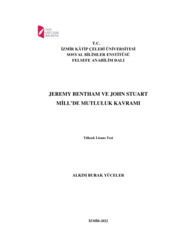Jeremy Bentham ve John Stuart Mill'de mutluluk kavramı Jeremy Bentham and John Stuart Mill concept of happiness
-
Eser Sahibi
Yüceler, Alkım Burak
- Tez Danışmanı Hilal Kahraman
-
Tür
Yüksek Lisans
- Yayın Tarihi 2022
-
Yayıncı
İzmir Katip Çelebi Üniversitesi Sosyal Bilimler Enstitüsü
- Tek Biçim Adres https://hdl.handle.net/11469/3013
-
Konu Başlıkları
Mutluluk
Mutluluk - Felsefe
ÖZETBu tezde Jeremy Bentham ve John Stuart Mill'in felsefi düşüncelerindeki mutluluk kavramına yükledikleri anlamların neler olduğu, diğer kavramlarla ilişkileri, her iki filozofun bu kavrama bakış açıları, yaşadıkları dönemin onların düşüncelerini geliştirmedeki etkileri incelenmeye çalışılmıştır. Ayrıca mutluluk kavramına İlkçağdan başlayarak 18. yüzyıla kadar geçirdiği değişim irdelenerek J. Bentham ve J. S. Mill'in felsefesi içerisinde kazandığı boyut faydacılık ilkesi temelinde ele alınıp benzer ve farklı yönleri karşılaştırılmıştır. Bu iki filozofun iyi kavramı, mutluluk ekseninde tanımlanmıştır. Bu anlamda mutluluğa ahlaki bir nitelik kazandırarak dönemlerinde ahlaki tanımlamalarıyla ön plana çıkmayı başarmışlardır. Günümüzde de düşünceleri oldukça yaygınlaşmış ve çok büyük oranda etkisini göstermiştir. Batı başta olmak üzere diğer bölgelerde de yaygınlık kazanmış olan faydacılık konusu insan mutluluğunu temele almaktadır. Mutluluğu temele alırken insanın ahlaki kurallarını da belirlemeye çalışmaktadır. Her iki filozofun mutluluk kavramı ekseninde faydacılığı birbirine benzemesine rağmen farklar da vardır. Mutluluğun çokluğu veya azlığını yapılan iyiliklerin sağladığı fayda büyüklüğüne göre değiştiğini ve bunun en çok insana yarar sağlanmasıyla doğrudan ilişkili olduğu düşünülmektedir. Bu bakımdan mutluluğun ölçütlerini belirleme noktasında faydacılığın temel görüşlerini taşımaktadırlar. Bu görüşler sergilenirken fikirleri benimseyenler kadar karşısında yer alanlar da vardır. J. Bentham ve J. S. Mill mutluluk kavramını faydayla ilişkilendirerek bir eylemin bireyin genel olarak hazzını çoğaltmasıyla ilgili olduğu düşüncelerine sahiptirler. Ayrıca faydacılık anlayışının sadece mutluluğu arttırmakla alakalı olmadığını var olan acıyı indirdiği gibi gelecek olan acıyı önlemesinin de faydacı ilkeye uygun olduğunu düşünmektedirler. İki filozof da acı veya hazzın sadece bireye ait olmadığını kendilerinin ait olduğu toplumun da bu kavramlarla ilişkili olduğunu göstermektedirler. Genel bir ifadeyle faydacı bir yaklaşımla bireyin ve toplumun mutluluk anlayışlarını belirlemeye çalışmaktadırlar. Bunu gerçekleştirirken birçok eleştirinin hedefi olurlar. Bu bakımdan tez içerisinde faydacılık ekseni üzerinde mutluluk kavramına gelen eleştirilere de yer verilmektedir. Gelen eleştiriler sayesinde temel görüşlerin zayıf olduğu argümanları güçlendirmek mümkünken bazı eleştirilere cevap bulmak zordur.ABSTRACTIn this thesis, the meanings attributed to the concept of happiness in the philosophical thoughts of Jeremy Bentham and John Stuart Mill, their relations with other concepts, the perspectives of both philosophers on this concept, and the effects of the period they lived in on the development of their thoughts were tried to be examined. In addition, the change in the concept of happiness from the Antiquity to the 18th century was examined, and the dimension gained in the philosophy of J. Bentham and J. S. Mill was discussed based on the principle of utilitarianism, and its similar and different aspects were compared. The concept of good of these two philosophers is defined on the axis of happiness, and they have succeeded to come to the forefront with their moral definitions in their period by giving happiness a moral quality. Today, his thoughts have become quite widespread and have shown a great influence. The subject of utilitarianism, which has become widespread in other regions, especially in the West, is based on human happiness. While basing happiness on the basis, it also tries to determine the moral rules of human beings. Although the utilitarianism of both philosophers is similar in terms of the concept of happiness, there are also differences. It is thought that the abundance or scarcity of happiness varies according to the size of the benefit provided by the good deeds and this is directly related to the benefit of most people. In this respect, they have the basic views of utilitarianism at the point of determining the criteria of happiness. While these views are displayed, some are against them as much as those who adopt the ideas. J. Bentham and J. S. Mill associate the concept of happiness with utility, and they think that an action is about increasing the pleasure of the individual in general. In addition, they think that the understanding of utilitarianism is not only about increasing happiness, but also reducing the existing pain and preventing future pain is following the utilitarian principle. Both philosophers show that pain or pleasure does not only belong to the individual but also that the society they belong to is related to these concepts. In general terms, they try to determine the happiness understanding of the individual and society with a utilitarian approach. In doing so, they become the target of many criticisms. In this respect, criticisms of the concept of happiness on the axis of utilitarianism are also included in the thesis. While it is possible to strengthen the arguments in which the basic views are weak, it is difficult to find answers to some criticisms.
-
Koleksiyonlar
ENSTİTÜLER
SOSYAL BİLİMLER ENSTİTÜSÜ

 Tam Metin
Tam Metin

